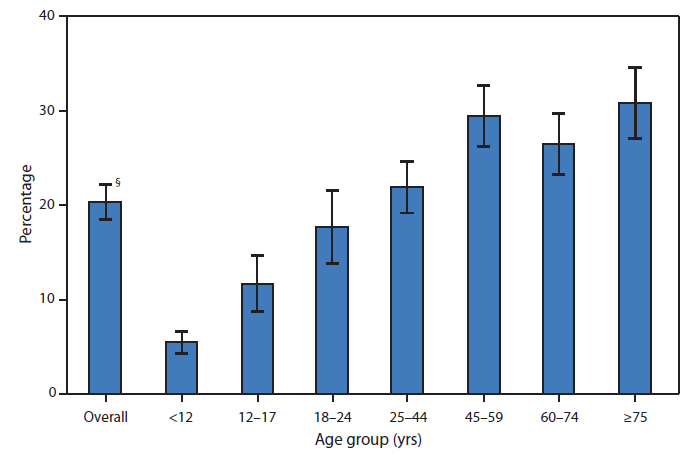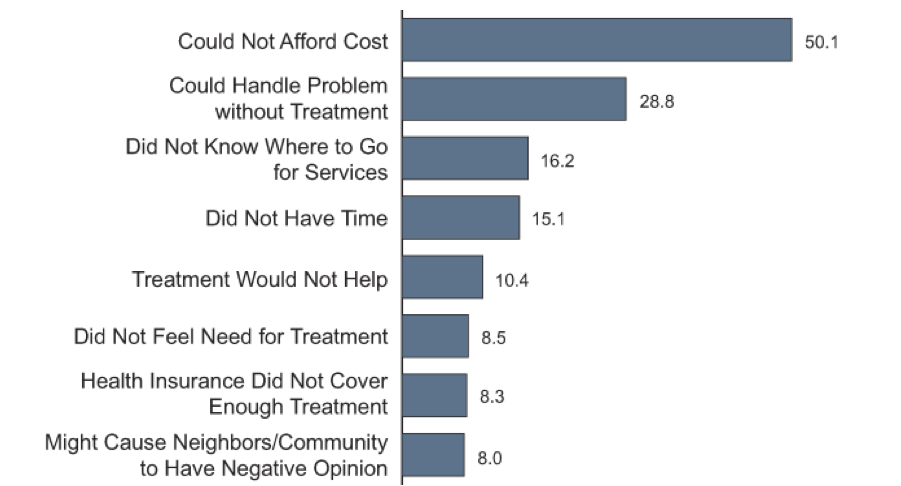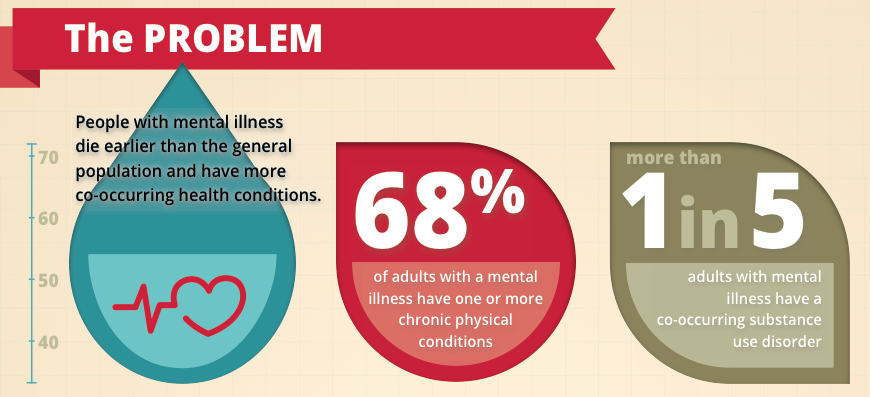‘Affordable Colleges Online’ created this guide to inform college students (and their friends and families) on the various on-campus and online resources they can use should a mental health concern arise:
Tag Archives: Treatment
1 in 5 Primary Care Visits were Mental Health-Related
The Centers for Disease Control and Prevention’s November 28, 2014, Morbidity and Mortality Weekly Report (MMWR), highlighted that in 2010, 20% of all visits to primary care physicians included at least one of the following mental health indicators: depression screening, counseling, a mental health diagnosis or reason for visit, psychotherapy, or provision of a psychotropic drug. The percentage of mental health–related visits to primary care physicians increased with age through age 59 years and then stabilized. Approximately 6% of visits were for children that were 11 years old or younger and approximately 31% of visits were for adults aged 75 years or older were associated with mental health care. The data was obtained from the 2010 National Ambulatory Medical Care Survey, which can be found at http://www.cdc.gov/nchs/ahcd.htm
* A mental health visit was defined by at least one of the following: ordering or provision of depression screening, psychotherapy, or other mental health counseling; a mental health diagnosis or reason for visit; or a psychotropic medication that was ordered, supplied, administered, or continued at the visit. Mental health diagnosis, reason for visit, and psychotropic medications were based on certain categories. Source: Olfson M, Kroenke K, Wang S, Blanco C. Trends in office-based mental health care provided by psychiatrists and primary care physicians. J Clin Psychiatry 2014;75:247–53.
† Includes physicians in primary care specialties: general and family practice, internal medicine, pediatrics, and obstetrics/gynecology.
§ 95% confidence interval
Getting Help for Depression
In any given year, 1 in 10 adults in the U.S. are affected by depression. Depression is a brain disorder that affects how you feel, think, and act. People with depressive illnesses do not all experience the same symptoms. The severity, frequency, and duration of symptoms vary depending on the individual and his or her particular illness.
Signs and symptoms include:
> Persistent sad, anxious, or “empty” feelings
> Feelings of hopelessness or pessimism
> Feelings of guilt, worthlessness, or helplessness
> Irritability, restlessness
> Loss of interest in activities or hobbies once pleasurable, including sex
> Fatigue and decreased energy
> Difficulty concentrating, remembering details, and making decisions
> Insomnia, early-morning wakefulness, or excessive sleeping
> Overeating, or appetite loss
> Aches or pains, headaches, cramps, or digestive problems that do not ease even with treatment.
> Thoughts of suicide, suicide attempts
There are different treatment options that can help, which may include medication, therapy, or combination of both. With effective treatment, the symptoms of depression will gradually get better.
If you are in crisis or thinking about harming yourself, or know someone who is, tell someone who can help immediately.
> Do not leave your friend or relative alone, and do not isolate yourself.
> Call 911 or go to a hospital emergency room to get immediate help, or ask a friend or family member to help you do these things.
> Call the toll-free, 24-hour hotline of the National Suicide Prevention Lifeline at 1-800-273-TALK (1-800-273-8255); TTY: 1-800-799-4TTY (4889) to talk to a trained counselor.
For more resources and information on depression and other mental health disorders, please visit:
Online Mental Health Screening
The Mental Health Association of Minnesota has partnered with Screening for Mental Health, Inc. to provide free online screening for mood and anxiety disorders. This anonymous online assessment screens for depression, bipolar disorder, generalized anxiety disorder, and post-traumatic stress disorder. This screening is not a substitute for a diagnosis, but it will help determine whether or not a consultation from a health professional would be helpful. If you want to follow-up with a health provider, but have limited or no health insurance, MHAM can help find a sliding fee clinic or other medical coverage options. To speak with an advocate, call 651-493-6634 or 800-862-1799.
Get Help. Get Well.
Get Help Get Well helps people understand what to expect when seeking mental health care for the first time. Get Help Get Well includes information on…
> The first steps to obtaining care; healthcare providers to see initially; and factors to consider when seeking a healthcare provider.
> What may occur in the initial appointment; questions that may be asked by the health professional; and questions the patient may want to ask their health provider
https://mentalhealthmn.org/be-informed/get-help-get-well
Depression and Bipolar Support Alliance
The Depression and Bipolar Support Alliance (DBSA) is the leading peer-directed national organization focusing on the two most prevalent mental health conditions, depression and bipolar disorder. DBSA provides online resources and peer support groups.
http://www.dbsalliance.org/site/PageServer?pagename=home
Support Groups in Minnesota
You are not alone out there. Utilize support groups to share mental health needs and concerns affecting your life and the lives of others.
MHAM Sponsored Support Groups: DBSA Support Groups (Depression & Bipolar Support Alliance)
Other Minnesota Support Groups and Activity Centers
National Institute of Mental Health
The National Institute of Mental Health (NIMH) provides the latest research and information on depression and other mental health conditions.
http://www.nimh.nih.gov/health/topics/depression/index.shtml
MentalHealth.gov
MentalHealth.gov provides information and resources on mental illness for people experiencing a mental health disorder, family and friends, and other members of the community.
http://www.mentalhealth.gov/index.html
The Last Gold Leaf Releases EP Opaque
By Derrick Keith, Band Member, The Last Gold Leaf
When I was sixteen my parents bought be my first guitar as an Easter present. I never thought of myself as a musician. I was the kind of kid that spent endless hours locked away in my room, pencil in hand, drawing feverishly, seeking desperately to express the fanciful worlds in my head into images on a page. In fact, even as I began writing songs I never imagined I would seek to make a career out of music.
Picking up that guitar unlocked an urgency in me. I found that others could identify with the loneliness and depression that informed my music. And that made us all a little less lonely, the days seem just a little bit brighter. I was hooked and there was no looking back. I set out to find that connection on a larger and larger scale.
If I were to try to sum up my goal as a songwriter in one word I think it would be “fearless.” I believe my role as an artist is to bring light to those dark places in our psyche that we become afraid to talk about. The unpretty things: addiction, poverty, hunger, betrayal. It seems as if our culture is almost engineered to isolate ourselves from one another. But it’s in recognizing our griefs, our failures, in forgiving that we can tear down the walls we built originally to protect us. The walls we found cut us off from our lifelines.
I have seen friends, family members, lovers, strangers in deep hurt. In need of help. Become helpless. But I believe in the power of music to heal. To foster community. To open up wounds to draw the infection out. I seek to bring to the surface the ugliness so we can accept one another.
That’s why I reached out to the Mental Health Association of Minnesota (MHAM). Music can raise the questions, but MHAM has the resources to help heal the wounds. None of us can do it alone. According to the National Institute on Mental Health’s website, In 2012 18.6 percent of adults ages 18 and above were diagnosed with mental illnesses. That’s almost 2 out of every 10 people. And that’s just the people seeking help.
If you or a loved one you know have questions, seek help.
The Mental Health Association of Minnesota is proud to support the band The Last Gold Leaf in their upcoming EP release party for their new album Opaque. Through this release party for the EP Opaque, The Last Gold Leaf hopes to generate awareness of mental health and point people in the right direction to find treatment and services for mental illnesses. Staff from MHAM will be at the party to share information about mental health and our services. A portion of the proceeds from this event will benefit the Mental Health Association of Minnesota.
Guests include: Parachute Empire, The Lost Wheels, and Kara Doten
Featuring photography by Haythem Lafaj
Location
The Stu
77 13th Ave NE
MInneapolis, MN
Cost: $11
What to Expect at Your First Appointment
Seeing a health professional for any type of health condition can be daunting. Being prepared before an appointment can alleviate some of that pre-appointment angst and can create better outcomes after the visit. Below are a few possible questions that may be asked from your health professional and questions that you may want to ask during that appointment. Having some of these written down before your appointment may be helpful.
The following are some questions that may be asked by the health professional you are seeing:
- What symptoms are you experiencing or have experienced, frequency and intensity, and how has this affected your daily life/routines?
- Is there a past history of mental health issues?
- Any family history of mental health issues?
- Any substance abuse – past and present?
- What prescribed medications, over-the-counter medications, dietary and herbal remedies, and vitamins or minerals are you taking?
You may want to ask your health provider about the recommended course of treatment and what options are available to treat your health condition, along with expectations of each.
If you are prescribed a medication, you may want to ask:
- What the medication is for and how is it going to help you?
- How and when should you take it and how much should you take?
- How long will you be on this medication?
- What should you do if you miss a dose?
- Will it interact with other prescription or over-the-counter medications, dietary or herbal remedies, vitamins or minerals?
- Should it be taken with food? What food or drinks should you avoid while taking this medication?
- What are the side effects of this medication and what should you do if you experience them?
- Who should you contact if you have any problems or questions about the medication(s)?
For more information on seeking help, visit Get Help, Get Well on the MHAM website.
Contacting a Health Provider About a Mental Health Condition
When symptoms of a mental health condition emerge, knowing whom to contact can be somewhat confusing. Below provides some information on who to contact first, type of professionals one might see, and tips on seeking a provider.
If you have health insurance, you can either contact your health care provider or contact your insurance provider for covered health providers. If you do not have insurance or you have limited coverage, you may want to call your county to see if you qualify for services for mental health treatment.
Depending on the type of coverage you have and what your health provider recommends, the type of health professional you see initially may vary.
Primary care providers or general practitioners can provide the initial assessment to see if you are experiencing a mental health condition. If necessary, they can provide medications for certain types of mental health conditions and can also provide a referral to a mental health professional for further evaluation and treatment. They may also utilize labs or medical tests to rule out any contributing health issue that may be causing your symptoms.
There are many different types of mental health professionals and many types of therapies. The type of therapy will often depend on each individual and the condition(s) that need to be addressed. Certain mental health professionals can also prescribe medications if needed.
Things to consider or to ask when seeking a provider:
- Review information (bios) about available health professionals. What are their specialties? How available are they at the desired location?
- Do you have any specific requests for finding a health professional? (culture specific, gender specific, faith-based, prior military background, etc.)
- Your appointment may be set up by a scheduler. Be sure to let them know if you have any specific requests.
- Would it be helpful to have a trusted friend or family member help you make the first appointment? For some, a loved one may provide that needed encouragement and support for seeking care.
For more information on seeking help, visit Get Help, Get Well on the MHAM website. Do you have more questions about contacting a health provider? Please contact us.
* * * * * * * * * * *
If you are in crisis or thinking about harming yourself, or know someone who is, tell someone who can help immediately.
- Do not leave your friend or relative alone, and do not isolate yourself.
- Call 911 or go to a hospital emergency room to get immediate help, or ask a friend or family member to help you do these things.
- Call the toll-free, 24-hour hotline of the National Suicide Prevention Lifeline at 1-800-273-TALK (1-800-273-8255); TTY: 1-800-799-4TTY (4889) to talk to a trained counselor.
Over One Third of Adults With MDE Did Not Speak With a Health Professional
In any given year, about 7% of the U.S. adult population experiences a major depressive episode (MDE). In a recent issue of The NSDUH Report from the Substance Abuse and Mental Health Services Administration looked at combined data from the 2008 to 2012 National Surveys on Drug Use and Health (NSDUH) that showed that more than one third of adults with past year MDE (38.3%) did not talk to a health professional or alternative service professional during the past 12 months. Of those who did seek help, 48% consulted with a health professional, 10.7% percent talked to both a health professional and an alternative service professional, and 2.9% talked to alternative service professional. The report suggests that primary care providers should consider using screening tools to identify patients that may be experiencing depression.
To view the The NSDUH Report: http://www.samhsa.gov/data/spotlight/spot133-major-depressive-episode-2014.pdf
For information on resources and the latest news and research on depression, please visit the MHAM website at https://mentalhealthmn.org/be-informed/mental-health-resources/depression
Getting Help
Most mental health conditions start to develop early in a person’s lifetime. Half of adult mental health conditions begin before age 14, and three-quarter of mental health conditions begin before age 24. Getting help for a mental illness is often delayed. In the U.S. the average duration of delay in treatment from onset of symptoms for mood disorders is 4 years and for anxiety disorders it is 23 years. If left untreated, many mental health conditions can worsen and lead to increased impairment in daily activities and functioning.
Stigma and barriers to treatment are often the causes for these delays. Results from the latest annual NSDUH survey of mental health findings show reasons why people with mental illnesses did not seek care. Below are the top 10 reasons from that survey (click here to see all responses).
* Based on the percent of adults with any mental illness that did not receive mental health treatment in the past year (2011). From the Substance Abuse and Mental Health Services Administration, Results from the 2011 National Survey on Drug Use and Health: Mental Health Findings, NSDUH Series H-45, HHS Publication No. (SMA) 12-4725. Rockville, MD: Substance Abuse and Mental Health Services Administration, 2012.
Getting help for a mental illness can be difficult. For those who are initially seeking mental health care for the first time, our website addresses some of these barriers. Get Help. Get Well, provides some information on who to contact first and what to expect at your first appointment. Talking with a trusted friend, family member, or someone else that you feel you could confide with can provide that needed support as well. Contact an MHAM advocate to ask questions you may have pertaining to seeking mental health care treatment.
Integrated Healthcare Works
In Minnesota, individuals with serious mental illnesses lose 24 years of life expectancy compared to those without these disorders. Cardiovascular disease, diabetes, high blood pressure and cholesterol, and obesity contribute to this early mortality. However, many of these health risks can be prevented or managed by early detection, treatment, and healthy lifestyle changes. An integrated healthcare approach can effectively address these issues and improve the health outcomes for people with mental illnesses.
The following infographic from SAMHSA-HRSA Center for Integrated Health Solutions explores the problem and illustrates the impact on communities and individuals. Click on the image below to see the full infographic.
The Minnesota Olmstead Planning Committee Wants to Hear from You!
When it comes to services for people with disabilities, how well do you think current public policies and practices in Minnesota meet your needs? What’s working for you? What isn’t? These are all questions the Minnesota Olmstead Committee would like to ask.
By October 2012, this committee must develop goals, recommendations, and a timeline that will become Minnesota’s Olmstead Plan. This Plan will be submitted to the State of Minnesota through the Minnesota Department of Human Services. The Minnesota Department of Human Services will begin to implement recommended changes in 2013.
You can help shape this plan by going to the Minnesota Olmstead Planning Committee’s website. The committee wants to hear from individuals living with disabilities, their families, service providers, and concerned community members.
The site is still being developed, but check back often for more information about the Olmstead Decision and ways that you can be a part of the conversation.



